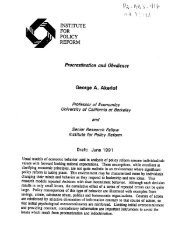FAMILIAL ADAPTATIONS TO THE INTERNATIONALIZATION OF ...
FAMILIAL ADAPTATIONS TO THE INTERNATIONALIZATION OF ...
FAMILIAL ADAPTATIONS TO THE INTERNATIONALIZATION OF ...
You also want an ePaper? Increase the reach of your titles
YUMPU automatically turns print PDFs into web optimized ePapers that Google loves.
-16-<br />
Moreover, it has been argued that the prevalence of female-headed households<br />
is not necessarily indicative of improved conditions for women; feminization<br />
of poverty has been noted as a widespread correlate in the Third World<br />
(Youssef et al. 1979:59 in Hatem 1983:14).<br />
As Hatem describes,<br />
Even though women had taken over, new agricultural tasks, the<br />
tendency had been for them to work under the auspices of younger<br />
or older men. In other words, the adoption of new work roles did<br />
not necessarily lead to greater independence, but substituted the<br />
missing head of the house-hold with the next male in line whether<br />
a son, a father, or brother-in-law. More importantly, the<br />
decision on how to spend this money from the remittances was often<br />
a male decision either by the migrant himself or his family. In<br />
other words, women might not necessarily gain any new<br />
decision-making power within the family as a result of the absence<br />
of the male head of the household and/or the availability of new<br />
sources of income _.. the general promotion and acceptance of work<br />
as a societal response tc change had not materialized ... The<br />
social and material rewards for women's involvement continued to<br />
be weak (Hatem 1983:15, 16).<br />
In light of my observations in Bahiya, one aspect of Hatem's assumption<br />
requires clarification. While it is true, as suggested by Khattab and El<br />
Daef, that not all migrant wives will gain new decision-making powers, it is<br />
nevertheless important to recognize that some of them do acquire at least<br />
temporary decision-making powers. Hatem's expectation oF the substitution<br />
of the missing head of the household with the next male in line is not<br />
uniformly borne out by observations Hi Bahiya. While women do usually<br />
function with some degree of male support during the absence of the heads of<br />
their household (or other signifirant male relatives), such support, even<br />
when readily accessible to women, does not necessarily curtail women's<br />
temporarily delegated decision-making powers. Female household heads often<br />
seek and secure the help (material and emotional) of males (and females),<br />
particularly cognates during the absence of their husbands, but it is the<br />
wife herself who acts as surrogate for absent emigrant husband. While the<br />
legitimacy of her decision-making powers may be accepted by some and<br />
rejected by others in certain cases, she is nevertheless the source of the<br />
decision. In some cases, power delegated to women by men takes on a legal<br />
character thereby acquiring a more permanent duration. This occurs when a<br />
husband registers land that he owns or controls on a contractual basis in<br />
the name of his wife.<br />
This clarification aside, observations in Bahiya support Hatem's<br />
contention that" ...while changes (in women's work roles) could be observed<br />
... they did not constitute sufficient basis for challenging the character<br />
of the existing patriarchies" (emphasis added). Ditferently stated, the<br />
case of Bahiya indicates that male out-migration has not produced a
















